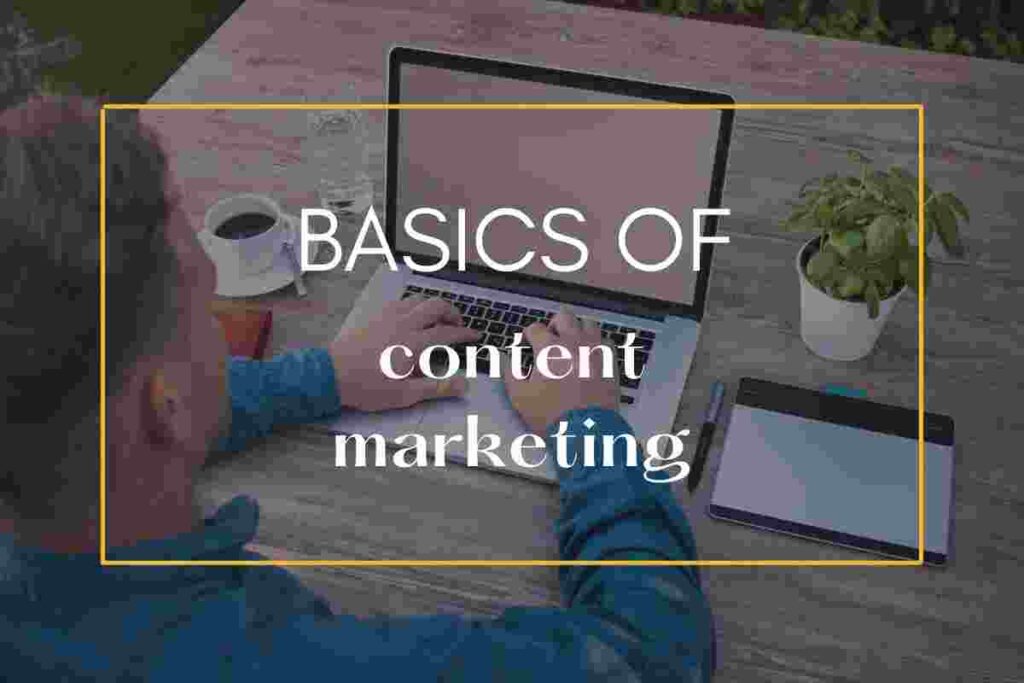Content marketing is more than color and branding. Your personality, personal brand, tonality of blog posts, target audience, connection with audience, etc. also play a major role in content marketing strategies for bloggers. Do bloggers need content marketing strategies? Yes, absolutely!
Gone are those days when you could write whatever you wanted to your heart’s content and get the clicks and the views.
Writing irresistible blog posts that are helpful and make readers want to come back for more is content marketing in a nutshell.
Converting these casual readers into loyal subscribers should be your ultimate goal. These loyal subscribers are the ones that will buy from you and be your brand ambassadors because they trust you.
For this seamless transition from an intrigued reader to your raving fan to actually happen, you will need a solid content marketing strategy in place!
How can you do this? It’s easy if you have a roadmap of what you want to achieve and how you’ll be doing it.
For laying out a roadmap, you’ll first need to understand what content marketing is and how to come up with strategies as a blogger or business owner.
What is a Content Marketing Strategy?
Content marketing is planning, creating and promoting meaningful and impactful content that solves problems and retains a well defined audience.
A content marketing strategy is a roadmap that helps you achieve your blogging goals and establish a personal brand.
The first step to content marketing is obviously content. Now what if you have a writer’s block or just lack the general motivation to produce content?
I’ve got you! Here are some Tips to Write Blog Posts When You’re Not Feeling Like It!
What is a good content strategy? Well, the first step to achieve this is having impeccable blog posts that readers get value out of.
Hitting all the pain points and providing solutions to those problems is how you can claim your ‘good content strategy’ ticket.

But, as we all know writing SEO optimized blog posts will barely make you a dime, especially if you’re new to blogging and don’t have a high authority. There’s a lot more that goes on after you hit ‘publish’.
This is where content marketing comes into play. What does this have to do with bloggers anyway?
Content marketing is usually written about with reference to businesses. But, what most bloggers don’t realize is that blogging is a business! If monetization is your end goal.
Knowing why content marketing strategies are necessary to fuel your blogging business and achieve those blogging goals of yours will make you want to create your own content marketing strategy.
This post contains affiliate links through which we may make a small commission at no extra cost to you. Read the full Affiliate Disclosure.
Why Bloggers Need Content Marketing Strategies
1. Set Blog Goals
Content marketing strategies help you set and measure goals.
Goal setting for blogs is essential as it will allow you to know what exactly to expect and how much you’ll have to work to achieve your goals.
Blogging is a business and if yours is a one-man show (like mine), you’ll lose your mind as there’s a million things that need your attention at the same time.
So, planning at least 3-4 months worth of content is a lifesaver.
Holding yourself accountable and keeping track of your progress will motivate you to do more.
Learn How to Set Realistic Blogging Goals for Your Blog to get a better understanding of goal setting!
2. Effective Time Usage
Content marketing strategies will help you plan out engaging content well in advance. Imagine planning one year’s worth of content in one month.
Fluff? None here! This challenge by The She Approach (a successful six figure blogger) will help you do exactly that. Check it out to get your content sorted! Click here.
This means you can utilize the extra time to improve the existing content. Google loves an up to date blog.
Those blog posts you published a few months ago and forgot about, it’s time to spice them up a little.
There’s a 100% chance of you finding something you’d want to add to it. Do this quite often as this is a way to keep your blog post content fresh and updated.
Apart from that, you can get on with promoting your blog posts on those social media platforms where your target audience hangs.
Yes, only on those platforms where your readers are most likely active. From infographics to open ended questions, there’s a lot you can do for engagement.
3. Understand Target Audience
Are the readers that find your website clicking off right after they click on one of your links? Do they stay for a long time?
Are they clicking on your landing pages? After how long? Which section of the blog was interesting?
Too many questions run across a blogger’s mind every time they publish a blog post. Lucky for us, there are tools to track a reader’s actions every time they land on a blog post.
The most accurate and effective way to determine audience behavior is through Google Analytics.
This is by far the best way to not only figure out your readers’ interests but also track how leads are being generated. Here’s how you can Use Google Analytics to Grow Your Business.
Learning your audience is easily the best way to improve, stay up-to-date with trends and your competitors.
Publishing blog posts, social media posts, tweets and going into exile expecting things to fall into place is… not going to work anymore?! This isn’t the 80s.
With digital marketing, there’s no excuse for you not connecting with your audience. Done posting your content? Now check what’s up with the analytics a few hours later and do this once in a while.
Is it as planned in your content marketing strategy? Then, good for you! You know what your audience likes. If no, you’ll have to go back and check how and where you can improve. See how your competitor is doing too.
Loving the content so far? Get more blogging and content marketing tips by subscribing to the list!
4. What Works And What doesn’t
Find the most and least popular blog posts on your website and re-read them. You can do this using Google analytics. Find any difference between the two?
Niche, tonality, topics, titles, call to action, etc. Note them down. This will help you a lot in creating content in the future.
Add follow up posts to your most popular blog posts as your audience is interested in that topic. As far as least popular posts are concerned, try and alter them. Never delete them. Those posts tell what doesn’t work for you.
But this doesn’t mean you don’t try new methods of writing and marketing. Don’t be afraid to try as after a point, people will get bored of the same old content.
Remember to divide your audience into segments if you are blogging about more than one topic. This way you can send personalized emails and deals to them.
5. Build Readers’ Trust
Now that you know what works for you and what doesn’t, you can focus on creating more content that resonates with your audience.
Also, strategically planning out your content well in advance will keep your readers engaged and in turn helps you build trust.
Forcing your readers to buy products when they don’t know you enough won’t work. As we all know, people only buy from people whom they trust.
Putting out valuable and meaningful content for free and engaging with your audience, solving their problems is the easiest way to gain their trust.
Editing out the unnecessary fluff will make a massive difference. On writing by Stephen King will help you a ton with this. His book will give you an idea of what good content writing is.

If your audience behavior is same as what you expected, then that’s great. This is how you measure the ROI of a content marketing strategy.
It’s easy if you have a roadmap of what you want to achieve and how you’ll be doing it.
6. Generate Leads With Content
Most bloggers and businesses eventually want to sell their products and services. As your audience trusts you enough to get the products recommended by you, they are most likely to buy from you.
These loyal subscribers will be your brand ambassadors and spread the word about your products. In a way, you are generating leads with your content. Apart from this, ensure all your blog posts have a strong call to action.
This gives every visitor to your blog a chance to become your subscriber. You don’t have to be selling products to do this.
A simple email newsletter providing value should be good enough! Create separate landing pages that cater to specific lead magnets is key.

Cashvertising by Drew Whitman is a must read as he goes into the nitty gritty of how to sell.
7. Grow Your Personal Brand
Whether you are an anonymous blogger, a group of people behind one blog or someone with their face on the internet, you need to have a personal brand. Personal brand is beyond a “face” or Instagram posts and tweets.
Building an online persona is key to not only getting your work recognized just by a quick glance, but also connecting with your audience on a deeper level.
People tend to trust you more when they know for a fact that there is someone real behind the screen that cares about their problems and isn’t just full of fluff.
Remember when brands could get away with ‘this is the best product and is endorsed by this *insert famous actor totally unrelated to the product they’re selling* so you should buy it‘. Well guess what, this doesn’t work anymore. Why? No personal branding!
What company comes to your mind when I say a long cup that probably costs $5 and is everybody’s to go when it comes to coffee or lattes.
Guess what brand I’m talking about in the comments! Let’s see if their branding has worked. This ties into the first part of my point. Getting recognized the minute someone looks at your work.
These were some of the reasons to consider content marketing strategies for bloggers and businesses. Will you be creating your content marketing strategy? Or do you already have one? Tell me more about it in the comments. I’m curious!
If you liked this blog post, the easiest way you can help is by sharing this thread on Twitter! I’d really appreciate it.
I send out a newsletter twice a month with in-depth blogging and marketing tips. Subscribe if you’d like to receive one!


I need this. I’ve just started blogging, and there is still so much that I don’t know, especially about finding new content. I’m going to save this so I can keep re-reading it! Thanks for the tips.
Thank you so much! All the best:)
This was very detailed but manageable and useful post on content marketing strategies. Thank you for the challenge of planning content well ahead of time.
Thank you so much Kimberlie!
Very helpful roadmap. I’m a new blogger, and frankly need all the help I can get! Definitely bookmarking this to read again later.
That’s great! Thank you:)
I am trying to work on a content strategy for my blog. Once upon a time I had another website/blog and had a clear vision for it. I write down ideas every time I think of something, but I don’t feel like I have a strategy yet, not for accomplishing the objectives I have for my blog. I subscribed to your newsletter. You’ve given some food for thought.
That means a lot to me, Patty! I’m sure you’ll figure things out.